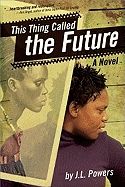
This Thing Called the Future
Written by J.L. Powers
Cinco Puntos Press, 2011, 208 pp.
ISBN: 978-1933693958
Fourteen-year-old Khosi lives in the outskirts of Pietermaritzburg, a post-apartheid shanty town of South Africa with her mother, Elizabeth, her grandmother, and her little sister, Zi. Her parents are not married because her father, being poor, was not able to pay a dowry for Koshi’s mother. Although Khosi’s family is not privileged, the mother, a school teacher, is able to support her daughters on her own and her independence sets her apart from other women. While Koshi finds joy in going to school and learning, her life is overshadowed by the presence of AIDS and the growing number of victims in her community. In order to stay safe, the grandmother introduces her to the world of folk beliefs and encourages her to turn to the ancestors for help and protection. Koshi’s mother, on the other hand, does not embrace the old traditions of Zulu people, and considers those rituals and folk beliefs silly superstitions. The tension increases when Koshi’s mother, accused of stealing money from their neighbor, falls ill. Koshi struggles to decide whether her mother suffers from AIDS or whether she is being punished by the ancestors for doing something wrong. In the face of this dilemma she is forced to take a stand.
As a coming-of-age story Power’s book tackles serious social issues and provides a realistic depiction of life. Instead of a complicated plot, the book focuses on Koshi’s maturation process and her struggle to reconcile her modern day life with the traditional beliefs of Zulu people. Traditions affect every aspect of Koshi’s life from storytelling and her ability to communicate with her ancestors through dreams, to going through rituals when reaching a new stage in life. In parallel she is also involved in mundane activities such as watching soccer games and TV soap operas. The two women closest to Koshi, her grandmother and her mother, represent these two very different life views, one that embraces traditions and one that considers them useless superstition. In spite of this conflict between generations, Powers manages to disrupt the binary through Koshi’s character who chooses to take the middle ground. Because of her special qualities, she decides to become a healer and help people in the traditional way. At the same time, she also embraces her favorite school subjects, biology and science, and studies to become a nurse and help people the modern way as well.
Similarly to her first book, The Confessional (2007), in This Thing Called the Future Powers explores social issues such as gender and sexuality, poverty and death. Although the depictions of violence and death in the book are harsh, the close relationship between the female characters as well as the growing friendship between Koshi and Little Man makes this novel a hopeful and powerful read. Unlike other realistic fiction books on similar social issues, for example, The Fattening Hut (Pat Lowery Collins, 2003) or The Day of the Pelican (Katherine Paterson, 2009) where the main characters escape their country of origin, Powers has not included this element of escape. Koshi stays and, despite the hardships, remains connected to her roots. In the Author’s Note, Powers talks about her extended research in South Africa while working on her book and includes a short explanation of the Zulu language in the glossary. Other books on South Africa this novel could be paired with are Out of Bounds: Seven Stories of Conflict and Hope (Beverley Naidoo, 2008) and Now is the Time for Running (Michael Williams, 2011). Similar books on the theme of spirituality and cultural traditions are Island’s End (Padma Venkatraman, 2011), on trauma and death in Fever 1793 (Laurie Halse Anderson, 2002) and on HIV in Playing with Fire (Henning Mankell, 2002).
Kinga Varga-Dobai, Georgia Gwinnett College, Lawrenceville, GA
WOW Review, Volume V, Issue 2 by Worlds of Words is licensed under a Creative Commons Attribution-NonCommercial-ShareAlike 4.0 International License. Based on work at https://wowlit.org/on-line-publications/review/v-2/

Congratulations to author Anne de Graaf and Eerdmans Books for Young Readers for today’s 2013 Batchelder Honor Book Award for Son of a Gun. The Batchelder is awarded by ALSC for the most outstanding books originally published in a foreign language in a foreign country, and subsequently translated into English and published in the United States. Read more at: http://www.ala.org/alsc/awardsgrants/bookmedia/batchelderaward